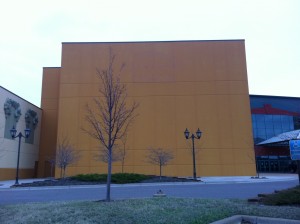The St. Michael City Council and St. Michael Planning Commission joined with City of St. Michael staff for a lengthy discussion on the proposed purchase of the former St. Michael Cinemagic Theater location by Riverside Church of Big Lake/Monticello following the city council’s regular meeting Tuesday, Sept. 8.
 Members of both government bodies received nearly 100 pages of materials on the subject, including letters written by city staff, attorneys representing Riverside Church and Riverside staff regarding the proposed purchase of the building, which is contingent on the city making changes to a current ordinance that does not allow churches or assemblies in commercial developments.
Members of both government bodies received nearly 100 pages of materials on the subject, including letters written by city staff, attorneys representing Riverside Church and Riverside staff regarding the proposed purchase of the building, which is contingent on the city making changes to a current ordinance that does not allow churches or assemblies in commercial developments.
The meeting, which ran until after 10:30 p.m., covered the church’s proposal to use the theater location as a satellite campus, or, as the church refers to it – a multisite mission. Church services, which take place at Riverside’s main campus across the Mississippi River from Monticello off Minnesota Highway 25, would be broadcast and screen to several theaters inside the current building. Other space, the church has said, would be used for religious education, gathering space and, possibly, retail or cafe, according to pastors Tom Lundeen and Skip Machmer.
City staff seemed less concerned about the future use of the site – sale is contingent on a government agreement with Riverside to change the use of the building – and more with the possible impact of Riverside’s presence on the northeast corner of O’Day Avenue and Highway 241.
“It’s not particularly what this site was designed for, and there were concerns, even with the theater’s presence, that a large assembly here would have huge impacts on the traffic at that intersection of Highway 241 and O’Day,” said St. Michael City Administrator Steven Bot. “What the theater was able to do was stagger show times so that you didn’t have arrivals coming into the location at a specific time, and when the movies let out, there was less traffic trying to make that turn across traffic onto the highway.”
A fatal crash earlier this year has put the intersection under a spotlight already. Bot said he’d like to work with the church on some sort of traffic study while the city’s two government entities – the planning commission and council – continue to study the site plans.
The delay in action by the city has rankled the church’s attorneys, who have said since the summer that a delay “causes hardship” for Riverside in its efforts to establish a satellite campus. The church, represented attorney C. Greg Howese, believes the city’s demand the church use the “regular” government process – starting with a request for a zoning ordinance variance or even and ordinance change in front of the St. Michael Planning Commission – places “undue burden” on the church in its attempts to purchase the theater, which closed in 2011.
The church believes the city’s current code, which does not allow a church to be constructed in an area designated for commercial development (to paraphrase), is in in violation of federal law.
The attorneys from the church are citing the Religious Land Use and Institutionalized Persons Act, or RLUIPA, an act confirmed in district court, in 2010, which states cities can’t place “undue burden” on religious organizations looking to rent or purchase gathering space, among other factors.
Lenhardt “100 percent disagrees” with the church’s position that asking the church to submit a variance request or zoning ordinance change is “placing undue burden” on the church.
“This is exactly how we would proceed with any organization looking to move ahead in the process,” he said at a June meeting of the city council.”If the church can show substantial burden, that’s a legal opinion. But as a city, we’re required by state law to use governmental reasoning. And to regulate a church differently than a non-church is open to question, certainly,” when it comes to zoning requirements.”
It appears that will take a step forward in October, when the Planning Commission will have its first discussion, officially, about the Riverside proposal on its agenda.
What Bot hopes will transpire is some sort of compromise. The current proposal by Riverside it to change the city’s zoning ordinance – and, in effect, its entire comprehensive plan – by allowing all churches in commercially zoned areas. That’s the way it’s presented, to date, Bot said.
However, the city could find a way to make a single exception, rather than a broad change. Or, it could send Riverside packing, refusing to adapt its ordinances, or, more drastically, not allowing assemblies in that area altogether, removing its future use as a theater, as well.
The next St. Michael Planning Commission meeting is set for 7 p.m. Wednesday, Oct. 1 at city hall.
CORRECTION: This article has been corrected to reflect Riverside’s request for a church use in commercial area and to clarify a quote. NWCToday regrets the error and any confusion caused.